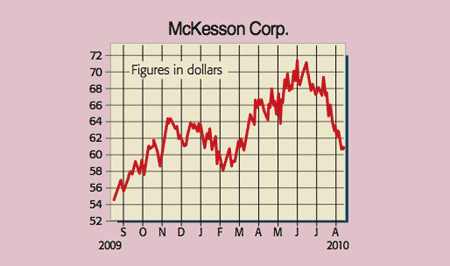
The recent pullback in equities has created investment opportunities among lower-risk and less economically sensitive large-caps. Take McKesson, a large drug wholesaler that distributes around one third of all medicines in North America. The shares are down 15% from June, despite the firm reporting solid quarterly results. Earnings per share (EPS) are up 17% per year over the past four years.
The firm has its roots in the cowboy era, when it delivered pills and potions by horse and cart across the Great Plains of the Midwest. McKesson now sells $100bn of drugs and surgical supplies to pharmacies, hospitals and retailers, such as Wal-Mart, CVS Caremark, Wellpoint and Rite-Aid. The firm’s immense size drives huge economies of scale and acts as a massive barrier to entry. But this is only part of the story. Drug distribution is set to generate 81% of group profits for the year to March 2011. But McKesson also owns a great IT business that operates in the sweet-spot of US medicine. This division develops software for hospitals and doctors, enabling them to manage patient records and payment information.
US government stimulus plans have assigned $19bn to implement just this type of scheme – more good news for McKesson. Wall Street is frustrated that this funding hasn’t yet been converted into hard orders, but this should only be a matter of time. The firm’s software arm delivers much higher margins of about 12%, compared to 2% for the wholesale part of the business.
McKesson (NYSE: MCK), rated a STRONG BUY by Standard & Poor’s
Obama’s reforms pledge to offer another 32 million Americans health insurance by 2014 (costing $938bn over the next decade). Since McKesson’s margins tend to be wider on generics, the shift towards these types of treatments over the medium term will also help. Note too that the elderly typically consume three to five times more medical supplies than younger people. Baby-boomers entering retirement and life expectancies lengthening will also help this firm.
Wall Street predicts 2010/2011 turnover and underlying EPS of $112bn and $4.82 respectively, rising to $116bn and $5.30 12 months later. That puts the shares on price/earnings (p/e) ratios of 12.9 and 11.8. The firm also enjoys a robust net cash position of $1bn. I’d value the wholesale arm on a ten-times earnings before interest, tax and amortisation multiple, and the IT side on two-times sales. After adjusting for cash, that gives a fair value of over $85 per share.
Admittedly there are risks, such as the group’s exposure to political interference (in Canada, for instance), pricing pressure from government reimbursement schemes and greater competition from the likes of Cardinal Health, AmerisourceBergen and AllScripts. But these fears are more than factored into the price and provide cautious investors with an attractive entry point into this expanding and defensively biased health-care play. Standard & Poor’s has a price target of $78 per share.
Recommendation: BUY at $62.50
• Paul Hill also writes a weekly share-tipping newsletter, Precision Guided Investments